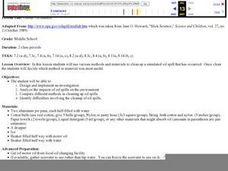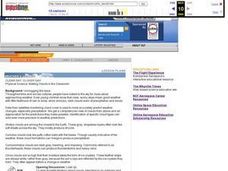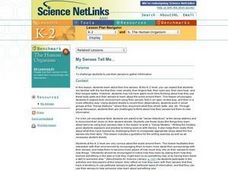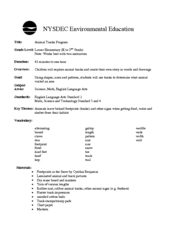Science Friday
Ugh, a Bug!
Young entomologists familiarize themselves with the physical characteristics of insects. Composed of two activities, each instructional activity involves your scientists tapping into their prior knowledge of bugs and making observations...
Endangered Species Coalition
Endangered Species Day Art
Albrecht Durer created a highly textured stamp or print of a rhinoceros. To better understand which animals are near extinction, upper graders create similar prints of endangered animals they've researched. The six-day instructional...
NASA
Cleaning Water
From their sweat to the water vapor in their breath, astronauts recycle every possible drop of water while in space. After watching a short video describing the different ways materials are recycled and reused in space shuttles, young...
NASA
Touchdown
Individuals design and build a set of shock absorbers to protect their astronauts when they land. Using a limited amount of supplies, pupils build a system that will keep two large marshmallows from flying out of a cup when it lands...
Safe Drinking Water Foundation
To Filter or Not to Filter
Drinking clean water can be taken for granted. Explore the process and high cost of filtering water with a water pollution and filtration activity. Young scientist build a filtration system to filter polluted water, examine the economics...
Agriculture in the Classroom
Pumpkins... Not Just For Halloween
Celebrate fall with four pumpkin themed hands-on activities! After learning about pumpkins, scholars complete two activity sheets that reinforce estimation and word problems. They then plant pumpkin seeds and bake a pie in a bag.
US Department of Agriculture
Sink or Float?
Will it sink or will it float? Learners predict the outcome as they drop random objects into a container of water. Then, they keep track of the results and record the data in a t-chart to draw a final conclusion.
University of Colorado
Looking Inside Planets
Researchers use scientific data to understand what is inside each of the planets. The first in a series of six, this lesson builds off of that concept by having pupils use a data table to create their own scale models of the interiors of...
University of Colorado
Looking Inside Planets
All of the gas giant's atmospheres consist of hydrogen and helium, the same gases that make up all stars. The third in a series of 22, the activity challenges pupils to make scale models of the interiors of planets in order to...
National Park Service
Leave it to Beavers
Many people know cats mark their territories by rubbing the back of their necks to leave a scent, but not many people know beavers also leave a scent to mark their territories. During the first activity of two, scholars use their noses...
PBS
Cloud Clues
It's cloudy with a good chance of learning! An inquiry-based lesson begins with an exploration of transparent, translucent, and opaque materials. Young scientists then connect their learning to the different cloud types as they take the...
Curated OER
Garden In a Glove
Students investigate the concept of seeds and how they can germinate. They obtain seeds and isolate them in a rubber glove before transplanting them into the ground. The activity includes a graphic organizer for observations or information.
Curated OER
Global Oil Busters!
Students design and implement an investigation of the impact of oil spills on the environment. They then identify and compare different methods in cleaning up oil spills. Students write letters to the Governor about why the material they...
Curated OER
How Do Bats Navigate At Night?
Through an experiment, learners explore how bats use echolocation. First, they discuss how sound travels through air waves. Then, they talk about the ways bats navigate in the dark. As an extension, they can write about what they have...
Curated OER
Oil Well That Ends Well
Focusing on the effect of oil spills on the environment, learners conduct experiments to explore this issue. First, they create an ocean environment using materials provided. Then, they make a simulated crude oil substance from vegetable...
Curated OER
Clear Day, Cloudy Day; Weather, Cloud Types and Formations
Learners explore the formation of clouds and different cloud types. Students simulate a cloud formation within a bottle.
Curated OER
My Senses Tell Me...
Students work at "Sense Stations" to explore each of the five senses.
Curated OER
Making Sense of Our Senses
Students participate in activities about the five senses. They explore objects, listen to stories and discuss the senses with classmates.
Curated OER
Water Filtration
Students demonstrate the four of five procedures that municipal water plants use to purify water for drinking. A water filtration system is designed by a student and their partner. A data chart is made to record all observations when the...
Curated OER
Fossil Fuels: Facing the Issues
Students explore energy by researching fuel usage on Earth. In this fossil fuel lesson, students define fossil fuels, the energy created by burning them, and the impact on the environment when using them. Students conduct pollution...
Curated OER
Animal Tracks Program
Entice your learners with this lesson on animal footprints. After reading the story Footprints in the Snow by Cynthia Benjamin, they use photos to identify animals and their footprints. Then they participate in an activity to classify...
Alabama Learning Exchange
Have You Seen My Mother?
Students listen to a read aloud of Janell Cannon's, Stellaluna as they examine how bats use their sense of smell. They examine the sense of smell by role playing as mother bats as identify different scents. They study bat facts at an...
Curated OER
Using Density to Identify Metals
Students learn how to measure the density of metals. For this density of metals lesson plan, students measure the density of various metals in order to determine what metals were substituted in a king's crown, scepter, breast plate and...
Curated OER
Egg to Butterfly
Students examine the life cycle of the butterfly through literature. In this butterfly life cycle lesson, students listen to a read aloud of Eric Carle's, The Very Hungry Caterpillar, and discuss the life cycle shown in the story. They...
Other popular searches
- Cotton Balls for Clouds
- Measuring Area Cotton Balls
- Smoking Cotton Balls
- Salt and Cotton Balls
- Food Web Cotton Balls
- Measring Area Cotton Balls
- Meas Ring Area Cotton Balls

























